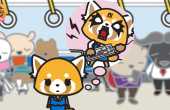Eden
Hi! I'm Eden. Talk anime to me. You can find me living under a rock and mumbling about intersectional feminism.
Contributor II
- Plebian Penman
- Lurker
- Pssst
- Sharp-Eyed Citizen
- Town Watch
- Detective Deskman
- Article of the Month
- ?
- Articles
4 - Featured
3 - Comments
30
- Ext. Comments
21 - Processed
30 - Revisions
23
- Topics
8 - Topics Taken
1 - Notes
42
- Topics Proc.
34 - Topics Rev.
5
- Points
1360 - Rank
83 - Score
802
Latest Articles
Latest Topics
What is in an anime opening?This topic involves an examination of the animated opening/ending credits sequences that bookend most popular modern anime. In anime, an opening credits sequence often highlights main characters, hints at plot arcs, and features the names of studio staff, all while synchronized to music. Analyze how an opening may influence the "tone" of a show, and how that may correlate to sub-genre. What does a "good" opening sequence do for an anime? What does it do or provide for audiences? Perhaps look into the history of opening/ending credits sequences in anime to compare how fans view & share these openings today online. (I had some trouble coming up with a catchy title, so any and all suggestions are welcome!)
|
Published | Fan Fiction & LGBT ExpressionLast week, Archive of Our Own (AO3), a major fanfiction archive and network, won the Hugo award for Best Related Work, an award never before given to a website or unpublished fan work. Fan fiction is the genre that comprises unpublished, written fan works based on other media, such as comics, television, film, and books. Perhaps because it is written by "amateurs" or because it is unpublished, fan fiction has often been scoffed at as unprofessional or self-indulgent. But for fans, fan fiction can be a way of reshaping popular media to reflect their identities. Members of the LGBT community in particular often criticize popular media for lacking compelling narratives surrounding LGBT themes, and when left unsatisfied, many fans turn to fanfiction to see themselves in the media they otherwise enjoy. How does fanfiction fill a void in representation for LGBT fans? What role does fanfiction serve in building and maintaining a fanbase, if any? And what happens when any particular piece of media garners a notable LGBT fan fiction fanbase? What transformative properties do LGBT fan works enact upon media, and what are the positive and negative consequences?
|
The Appeal of Paranormal TelevisionParanormal television encompasses the genre of "reality" television that focuses on ghosts and other spooky phenomena. Analyze the history and relevance of "ghost hunting" television shows and address a few reasons why the genre's popularity persists. How do these shows mesh reality television with history, travel, and detective/crime genres?
|
The Evolution of Anime StreamingAnalyse the growth and transformation of the anime industry in North America alongside the increasing accessibility of anime streaming. From disjointed episodes uploaded to YouTube in parts, to illegal fan-subbing websites, to today's officially licensed streaming sites like Crunchyroll and Netflix, how and where fans watch anime has drastically changed. Examine the ways this has impacted anime's popularity (and vice-versa) as well as the viewer experience. How has it affected shows that are not licensed to streaming services? What happens when a service fails (see: Amazon's Anime Strike)?
|
Published | The Good Place: Philosophically Sound?I think it would be interesting if someone familiar with philosophy or moral theory could dissect some of the main thematic elements in the television series "The Good Place". Main character Eleanor awakes after death in heaven, only to realize she isn't a "good enough" person to belong there. She receives lessons from a former ethics professor, which she attempts to apply towards her daily life to become a better person.
|
How to Remake an AnimeAnime reboots in the past decade have been common. Some of the most successful anime series among Western audiences have been remakes of older series: Fullmetal Alchemist was notoriously remade into Fullmetal Alchemist: Brotherhood by Studio Bones and experienced substantial commercial success. Hunter x Hunter was remade in 2011 and brought a new generation to love the series. Devilman Crybaby by studio Science Saru remade the 1972 cult hit Devilman and became a critical success and quickly a cult fan hit on Netflix. Dragon Ball Z Kai, a remake of the immensely popular Dragon Ball Z, experienced popularity domestically and abroad. But others have suffered: Basilisk: The Ōka Ninja Scrolls, and Berserk (2016) were critically panned. Mixed critical and fan reviews met Sailor Moon Crystal. This year, shoujo series Fruits Basket is due for an entire series reboot that promises to capture the nostalgia of the older series. What makes an anime reboot successful–is it the popularity of the source material, the production studio, or just passionate fans? This article will examine the history of full-series anime remakes, their popularity, and their critical reception, to show that not every series should be remade. For those that have been deemed successful, this article will look at common elements that contributed to their success and how they might be applied to future reboots.
|
Depictions of Abusive Parents in Anime/MangaAnime and manga is filled with the trope of abusive, neglectful parenting. Incredibly popular anime and manga have featured characters suffering from some history of emotional or physical abuse from their parents. Memories of this abuse tend to drive their motivation and goals. A few examples include Gaara, Hinata, and Naruto from Naruto, Shinji from Neon Genesis Evangelion, Historia Reiss from Attack on Titan, Todoroki Shouto from My Hero Academia, and almost all the Zodiac characters from Fruits Basket. Examples abound, and some of the most well-loved characters have horrible family histories. This article seeks to examine the prevalence of this trope, the psychology behind abuse, the importance of its depiction, and why it might resonate with readers. It also looks at how abuse is depicted in a visual medium, and how that affects how the character is interpreted by the audience. (Since there are so, so, *so* many examples of abusive parents in this medium, I'm curious as to whether I should hone in one one series instead of doing a broad sweep. Let me know what you think!)
|
Representation and Streaming Media: Why Gay Characters Matter in Netflix OriginalsBriefly outline and analyze Netflix original series that have garnered both positive and negative attention from the online LGBT community. Discuss why some series disappointed gay and queer fans, like Voltron: Legendary Defenders and Kiss Me First, and others delighted them, like She-Ra: Princesses of Power, Sens8, and Black Mirror. Potentially discuss whether other streaming services have "hopped on the bandwagon" with gay-friendly shows or have yet to catch up. |
Latest Comments
| GLOW: Actual Feminist Filmmaking in #MeToo Hollywood | |
Love how the article turned out! I started watching the first episode last night. You’ve got me hooked! | Person Of Interest: The Art of putting Kant’s Philosophy into a Computer |
Very thoughtful article. I like that you avoided throwing any specific celebrity under the metaphorical bus. We really need to do something about combating celebrity/idol worship and putting public figures on pedestals. | Problematic Creators: How Do We Interact With Their Work? |
Good point! That was a tangent that I felt deserved its own article. I’m thinking of different KPOP fandoms as well as western boy bands. Fic for “real people” has been around longer than most people realize, but the nature of writing about actual people has always been a slightly more sensitive topic than fictional characters. I think it would also be tied to a discussion about “cringe culture” and how celebrity worship/idolatry can both empower and harm young people (especially young girls). | Fanfiction and LGBT+ Representation |
Please share a link to your work, if you like! I’m sure I wouldn’t be the only one interested in more (GOOD!) lesbian representation! | Fanfiction and LGBT+ Representation |
Thank you, Jeff! Please let me know if they have any comments! | Fanfiction and LGBT+ Representation |
This is so true! So much of what is being traditionally-published (and therefore considered “legitimate” writing) isn’t exactly ground-breaking. And that’s okay: I don’t think writing needs to be completely ground-breaking and Pulitzer Prize-worthy to be enjoyed. But I know so many fics that are incredibly literary but dismissed because they’re shared online. | Fanfiction and LGBT+ Representation |
This is true, to a certain extent. But I caution you: I do think the large portion of female/gender-nonconforming individuals associated with writing fanfiction plays into it, as well as the societal preconception of all same-sex relationships as being oversexualized. Gay and queer couples have historically been oversexualized, and called “sexual deviants” and “queer” as a means of denying them the same rights as straight folks. So I would encourage you to question your concept of “oversexualized” and why it might only apply to gay couples. On the other hand, straight authors and media creators (particularly straight women) are notorious for objectifying gay male couples in harmful ways. I want to give writers the benefit of a doubt, but it’s actually hard to find gay writing written by gay authors. I highly recommend finding and supporting LGBT+ content creators through social media as a way of supporting authentic fic! | Fanfiction and LGBT+ Representation |




Great read! I’ve passed on this show for a while despite Netflix’s suggestions because I wasn’t sure whether it was strictly performative (haha) in its feminism or actually sincere. This article convinced me to give it a shot. Cheers!